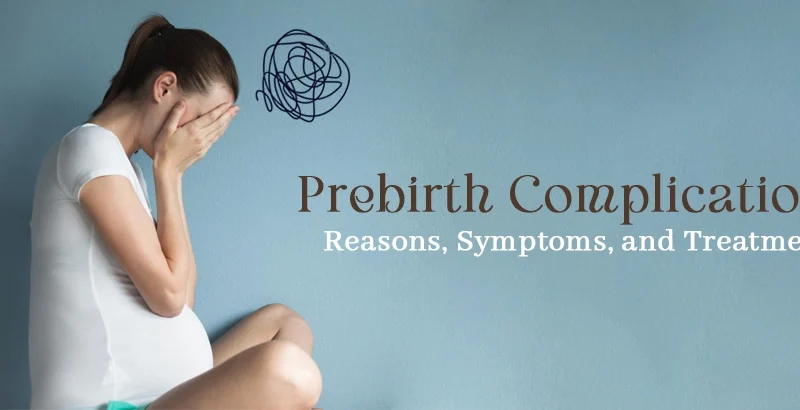Reasons, Symptoms, and Treatment –

The baby inside you develops through various stages of your pregnancy until the little one reaches the final stage, and it’s time for the child to see the world. Along with your baby, your pregnancy also progresses. At the same time, your pregnancy takes a toll on your whole body as well as your mind, and you may undergo several challenges like morning sickness or nausea, swelling, an achy body, and a tired mind.
With these symptoms, most of the pregnancies are uncomplicated and healthy. You’re also expected to give birth to a healthy baby.
However, certain health conditions can lead to several complications during your pregnancy.
What are the Common Pregnancy Complications?
Prebirth or pregnancy complications are some of the pre-existing and new medical conditions that may impact your health and the health of the baby inside you. So, the list of pregnancy complications includes:
Preeclampsia
Preeclampsia develops after 20 weeks of your pregnancy. When you visit your healthcare provider during this time, he checks your urine sample for the symptoms of preeclampsia.
The presence of protein in the urine and hands, face, and ankles, changes in vision, and weight gain determine preeclampsia during pregnancy.
Just a little bit of change in your lifestyle –eating healthy, being active, having medicines for it, as well as undergoing a c-section delivery are some of the treatment options for preeclampsia.
Gestational Diabetes
You are more at risk for gestational diabetes for certain reasons, and the reasons include:
- When you’re overweight or plus-size
- When you’re older than 25 or 30 years of age
- When there is a history of diabetes in your family
- When you are pregnant with twins
- When you had diabetes before you became pregnant.
According to CDC, 6% and 9% of pregnancies are diagnosed with gestational diabetes. When your pregnancy reaches between 24 and 28 weeks, your healthcare practitioner will check for the signs of Gestational Diabetes (unusually thirsty, visiting the bathroom quite often, and feeling tired) with a glucose screening test, and collect your blood and urine samples. You’ll feel the tendency to feel.
Uncontrolled gestational diabetes with the risks of preeclampsia increases the risk of your giving birth to a baby larger than the gestational age (a condition called macrosomia). An emergency c-section may also be necessitated.
Ensure that you keep your diabetes under control, by constantly evaluating your diabetes during every trimester, doing regular exercise, having a healthy diet, and including prescribed medicines. These are some of the best gestational diabetes treatment options.
Placental Complications
The placenta attaches to the uterine wall and helps the baby develop inside you. Due to various placental problems, like placental abruption, placenta previa, and retained placenta, there can be complications with pregnancy, labour, and childbirth.
Placental Abruption
Placental abruption is a complication during pregnancy when the placenta separates from the uterine wall before delivery. This can lead to vaginal bleeding, abdominal pain, and less oxygen and nutrients to the fetus. It can be a serious condition requiring immediate medical attention and may result in preterm labour or stillbirth.
Placenta Previa
The placenta is mainly situated in the upper part of the uterus, but placenta previa is when the placenta is attached to the cervix rather than the uterus. Such a condition occurs when you may have fibroids or other uterine problems, or if you have had earlier uterine surgeries. Based on the severity of the condition, you may have to visit the healthcare practitioner change your activities, and ensure bed red. You may give birth to a cesarean baby.
Amniotic Fluid Complications
The developing baby inside your womb gets the all-essential nutrients, and oxygen from the placenta, umbilical cord, and amniotic fluid. The amniotic sac and fluid are a bag of two membranes that form 12 days after you become pregnant.
As far as the functions of amniotic fluid are concerned, they include:
- Keeping your baby cushioned, and safe
- Keeping the temperature surrounding your baby warm
- Helping in the baby’s bone and muscle development
- Further supporting the umbilical cord.
However, due to placental complications as well as the presence of maternal health conditions, you’ll be experiencing signs of amniotic fluid complications – low or high amniotic fluid. As a result, there may be signs of birth defects, or low birth weight babies.
Anemia
You are at a higher risk of becoming anaemic during pregnancy if you are pregnant with twins, going through the severity of morning sickness, and not consuming enough iron in your pregnancy diet. You’ll feel tired or weak, your skin will look pale, rapid heartbeat, and breathing trouble due to anaemia during pregnancy. So, when you visit the healthcare practitioner, he or she is going to check red blood cells and plasma in the blood.
These conditions may differ from one would-be-mum to another. However, regular prenatal care is necessary.
Consulting your healthcare practitioner, being on daily medicines, being active, following a proper diet, and taking adequate rest are some ways of prenatal care.


